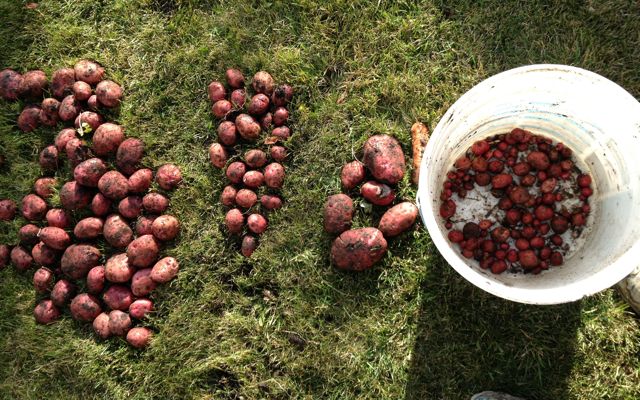Growing food is a skill I think every human being should have.
Many people know nothing about growing food and don’t want to know because they perceive that it’s hard.
They’re wrong.
Growing food is easy. Case in point:
At the end of May when I should have been planting my garden, I was travelling. Upon my return we had a solid month of rain. I finally planted potatoes July 10, six weeks later than tradition dictates (last week of May in Calgary).
I hand watered my potatoes a couple times, basically tossing a few gallons of rainwater at them when it was really hot and dry. I handpicked a few weeds twice, spending a total of maybe 20 minutes on the entire patch all summer. I didn’t even get around to hilling* them. In essence I could not have done less to propagate potatoes. Plain lazy!
Our first killing frost arrived October 13. (A killing frost sets the potato skins so they’ll keep longer). A few days later I dug my potatoes. From one kilo of seed potatoes I harvested all the potatoes in this picture, about 12 kilos.

There were dozens of marble-sized potatoes under each plant indicating that if the season were longer, they would have produced more. (They made perfect, melt-in-your-mouth roasted potatoes).
My potatoes are crisp and flavourful, despite a summer of neglect. They grew without the “benefit” of chemical fertilizers, pesticides, herbicides, and other noxious substances.
A friend of mine grew potatoes in PEI for a major food processing company. Following the company spray schedule was a condition of supplying them with potatoes. The farmer sprayed her potato crop for something every other day! Potatoes routinely appear on the Environmental Working Group’s Dirty DozenTM list of the foods most likely contaminated with chemicals.
Why are those potatoes so heavily sprayed when potatoes grow almost wild, without care at all, as my humble potato patch proved?
Michael Pollan, in his book, Botany of Desire tells us it’s because of our demand for the perfect long French fry. At least that’s what Big Food attributes to us.
Monocultures contribute to the problem. Huge tracts of one-species are like a TV commercial for a free buffet, attracting every bug and blight to which that plant is vulnerable. The modern solution is spraying.
Eventually the land is addicted to its drugs. Just like pharmaceuticals, once you take one agricultural chemical, then you need another to combat the effects of the first chemical.
Chemicals wipe out all life around the intended crop including beneficial organisms like soil bacteria, earthworms, insects (good and bad), bees, birds, bats and other natural predators, not to mention, contaminating groundwater, lakes and streams.
There is no proof any of these chemicals is safe for human consumption, never mind the cumulative toxic effect they have on the body. Then add the chemical assaults from our homes, our cars, our clothes, our cosmetics; the list goes on. No wonder rates of cancer continue to skyrocket.
Food that is grown in living soil, rife with minerals and beneficial bacteria, food that isn’t sprayed with toxins (sometimes called organic food) benefits our health in many ways:
- It contains more nutrients, including vitamins, minerals, phytonutrients and antioxidants. Recent research shows plants produce antioxidants and other beneficial chemicals to repel insects and other marauders unless they’re doped up on agri-chemicals. This partially explains the nutritional differences between plants grown with chemical versus organic growing practices.
- Fewer toxins mean lower toxic load for the body to process, resulting in less “dis-ease”.
- We even benefit from exercise and sunshine we get from growing food, however minimal it is. Gardening is the only exercise besides weightlifting recommended for the prevention of osteoporosis in women.
- Growing our own food helps heal the earth. Less fuel is used in production and transport, reducing pollution and other costs. Grass gobbles up a huge portion of synthetic fertilizers and fresh water in North America. Growing food instead is a better use of our resources.
- Growing our own food reconnects us to food and each other. Food made with human hands is often made with love. Factory food doesn’t contain love; usually you can’t pronounce what IS in it. Digging around in our own gardens spawns interest in others’ garden. Soon you have a community sharing resources.
I urge you to grow even a small portion of your own food. It doesn’t require much space or a great deal of effort or knowledge, as I have confessed. Usually, all you need to know appears on the seed packet.
Potatoes aren’t the only easy to grow food plant. Lettuce, spinach, carrots, beets, squash, and onions require little care and attention. Start a strawberry or raspberry patch with donated plants and eat fruit from them almost forever. Rhubarb and asparagus are perennial too. Perfect for lazy gardeners like me.
*Hilling potatoes is a “best practice” when it comes to growing potatoes. Soil is scraped into little mounds or hills at the base of the plants when the potato tops are six to twelve inches tall. http://www.wholerealfood.com/baked-fries/ prevents the tubers from peeking out of the ground and turning green, which renders them toxic. It also helps maintain moisture and coolness.